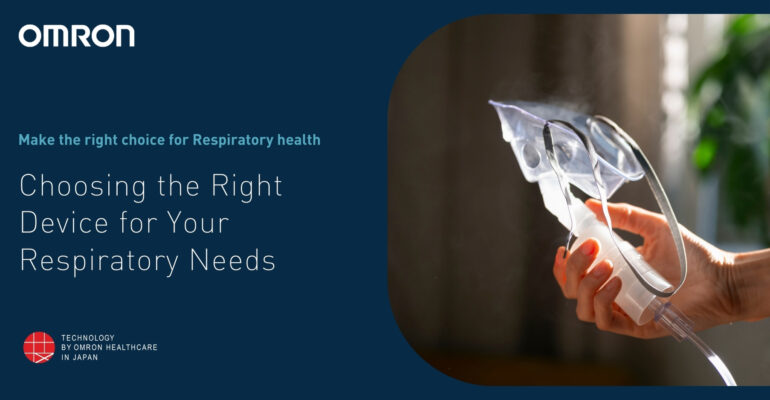Choosing the Right Device for Your Respiratory Needs
December 4, 2023 2024-06-26 15:32Choosing the Right Device for Your Respiratory Needs

Choosing the Right Device for Your Respiratory Needs
In an era dominated by technological advancements, the healthcare industry has witnessed a surge in innovative devices designed to monitor and improve various aspects of our well-being. For individuals with respiratory problems, selecting the right device can be a critical decision that significantly impacts their daily lives. In this blog, we will explore the different types of respiratory devices available, their features, and how to make an informed choice that aligns with your specific needs.
Types of Respiratory Devices:
- Nebulizers:
Nebulizers are commonly used to administer medication directly to the lungs in the form of a mist. These devices are beneficial for individuals with conditions such as asthma or chronic obstructive pulmonary disease (COPD). Portable nebulizers have become increasingly popular, offering the flexibility to manage respiratory issues on the go.
- Inhalers:
Inhalers, both metered-dose inhalers (MDIs) and dry powder inhalers (DPIs), are compact devices that deliver a controlled dose of medication directly into the respiratory system. They are commonly prescribed for conditions like asthma, providing quick relief during episodes of breathlessness.
- Oxygen Concentrators:
Oxygen concentrators are essential for individuals with chronic respiratory conditions that result in low blood oxygen levels. These devices extract oxygen from the surrounding air and deliver it through a nasal cannula or mask, ensuring a constant and regulated oxygen supply.
- Pulse Oximeters:
Pulse oximeters are non-invasive devices that measure the oxygen saturation levels in the blood. They are commonly used at home to monitor respiratory health, especially for individuals with conditions like sleep apnea or chronic lung diseases.
- Peak Flow Meters:
Peak flow meters are handheld devices that measure the maximum airflow a person can generate during forced exhalation. These are often used by individuals with asthma to monitor their lung function and detect early signs of worsening symptoms.
Factors to Consider When Choosing a Respiratory Device:
- Diagnosis and Condition:
The first step in selecting the right respiratory device is understanding your diagnosis and the nature of your respiratory condition. Different devices cater to specific needs, so it’s crucial to match the device with the requirements of your condition.
- Portability and Lifestyle:
Consider your lifestyle and mobility when choosing a respiratory device. Portable options like nebulizers and mini oxygen concentrators are ideal for those who need on-the-go solutions, while stationary devices may be more suitable for home use.
- Ease of Use:
The ease of use of a respiratory device is paramount, especially for individuals who may have difficulty in handling complex equipment. Choose a device with user-friendly features and clear instructions for efficient and stress-free usage.
- Maintenance and Cleaning:
Regular maintenance and cleaning are essential for respiratory devices to ensure their longevity and effectiveness. Consider devices that are simple to disassemble and clean to prevent the accumulation of bacteria and pollutants.
Omron Nebulizer: A Reliable Solution for Respiratory Care
Among the diverse range of respiratory devices, the Omron Nebulizer stands out as a reliable and user-friendly option. Designed to deliver medication in a fine mist for efficient inhalation, the Omron Nebulizer is especially beneficial for individuals who may struggle with using traditional inhalers. Its simple operation and portability make it a convenient choice for those needing respiratory relief at home or on the go.
The Omron Nebulizer is equipped with advanced technology that ensures consistent and effective delivery of medication to the lungs. Its user-friendly design includes easy-to-assemble components and straightforward operation, making it accessible for individuals of all ages. The portability of the Omron Nebulizer allows users to maintain their respiratory care routine wherever they are, promoting adherence to treatment plans.
In addition to its practical features, the Omron Nebulizer is known for its durability and long-lasting performance. This reliability is crucial for individuals managing chronic respiratory conditions, providing peace of mind that their device will consistently deliver the required medication for optimal symptom control.
Conclusion:
In the vast landscape of respiratory devices, finding the right one requires careful consideration of various factors. Your choice should align with your diagnosis, lifestyle, and ease of use. Whether it’s a nebulizer for quick relief, an oxygen concentrator for consistent oxygen supply, or a pulse oximeter for monitoring oxygen levels, the right device can make a significant difference in managing respiratory conditions effectively.






